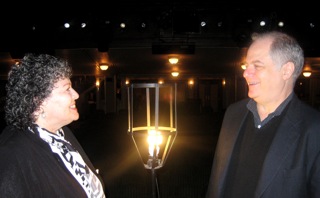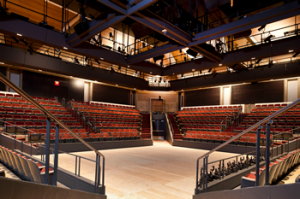Theatrical lingo, much like theatrical logic, works sort of like a secret code. “BREAK A LEG” in theatre jargon, for instance, means “Good Luck!” The term refers to the “break or bend of the leg” while taking a bow or curtsy. It’s as if the felicitation says “Great success tonight, with many curtain calls!”
A few favorite examples of this imaginative (sometimes loony) lingo are listed below:
GHOST LIGHT: Theatrical superstition says that if an empty theatre is left completely dark, a ghost will take up residence. That’s the reason a single ghost light is left burning center stage in every theatre in America, after everyone has gone home. I’ve often wondered if the light is to keep the ghosts out, or to welcome them in. Probably both.
The light also serves as a practical safety measure in case someone wanders near the edge of the stage without knowing that an orchestra pit looms below, awaiting their potentially hazardous fall.
The fact that I cherish most about ghost lights, however, is that each one is carefully crafted by a stagehand. And like snowflakes, no two are alike.
Frank Rich’s memoir, Ghost Light, is required reading for anyone serious about the theatre. (Is it necessary to disclose that Mr. Rich modeled the definitions of Writer and Critic for me decades ago? Well, anyway, he did. And he continues to inspire me with his Theatrical Intelligence in our changing world.) He and I had a good laugh recently on the stage of Broadway’s Nederlander Theatre (see photo above): the usual clear filament bulb had been exchanged for a CFL – a compact fluorescent, or “green” bulb! Less traditional perhaps, but a good superstition is hard to kill.
GEORGE SPELVIN: A fictitious theatrical name. Actors use this pseudonym to remain anonymous or to avoid their name appearing twice in the program if they’re playing more than one role. Sometimes the name is used when a character mentioned in the text never appears onstage; by crediting the role to “George (or Giorgio, Georgina, Georgette) Spelvin”, the audience isn’t tipped off that the character never shows up. Occasionally Actors Equity members working under a Non-Union contract (alas!) use the name to avoid penalties associated with Non-Union work.
VOMITORY: In a thrust or arena theatre, a vomitory is a ramped or stepped tunnel, giving performers access to the stage from beneath the seating area (see photo, right, of Arena Stage in Washington, DC). The term probably originated from the days of Roman amphitheatres, when those who were thrown to the lions managed to escape to tunnels under the arena, vomiting along the way. (Gross enough for you?)
Theatrical lingo includes hundreds of colorful terms, and just as many off-color ones. Please share your favorite in the Comment section above.
If you’re the first to come up with one I’ve never heard of, you’ll be my guest at a Broadway show!


Ann,
I never knew these things and my son is an equity actor! Thanks for enlightening me. These a fascinating facts that will resonate whenever I see these names, terms and more.
Thank you!
I have spent over 50 years in the theatre and never knew until now the derivation of the expression break a leg. So now please tell me where teaser and tormentor came from.
Thanks, Judy. The “enlightening” word is fun to hear!
And Roger, we both know that a Teaser is a horizontal drape across the stage, to hide the first line of electrics, and Tormentors are flats (or drapes) on each side of the proscenium, to adjust the width of the stage opening.
Where the terms came from? I have no idea – that wasn’t the challenge. After 40 years of marriage, however, it’s good to know that you still want to be my date!
I take it an airline ticket is not included? 🙂
You are oh-so-right, Kate. The good news is that if you win, your ticket could be used on your next trip to the Big Apple!
Love your blog, Ann, and have sent it on to several people I know in the performing and theater arts.
I am hooked (wonder where that phrase comes from). Thank you.
I, too, have been “connected” to the theatre for over 50 years and have been using the term “break a leg” — always curious about where it came from. Thank you for clearing this up for me. What a wonderfully theatrical explanation!
Thank you, Gayle, for passing along my blog – I’m very flattered. The next challenge is ramping up to release it into the world.
As for the word hooked: in theatrical terms it refers to the infamous long-handled-tool used by Management to remove Vaudevillians from the stage when they were booed by the audience. The crowds would cry “Get the Hook! Get the Hook!” No need to wait for the NY Times review when the Hook was around!
And Judi, it IS a theatrical explanation – thank you – I never actually thought of it that way! (That’s another remarkable thing about the theatre: everybody seems to learn from each other, every day.)
The German influence is interesting “Hals und beinbruck” break a leg and one other comes from the recesses of this mind “Mit Out Sound” MOS for the film buffs.
Wonderful stuff Ann: oh, yes the “magic room” for anything your heart desired. “Bang you’re dead” for the hapless actor whose prop master forgot to put the gun on the prop table.
Lovin this, Thank you.
congratulations on your blog ann. hope all is well with you! thanks for all the interesting information! fond regards, angelina
Tiffany, how about “I kill you with this poison jelly!” for that same hapless actor. (This was actually said in a production when the gun was missing!)